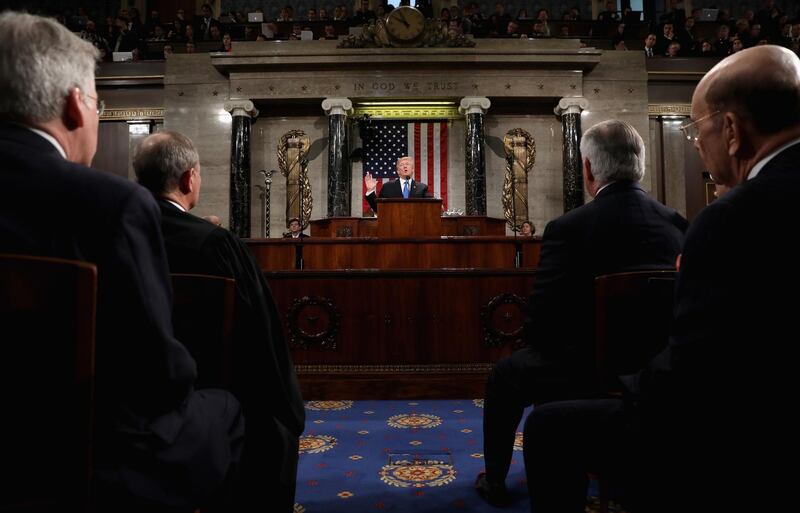In his 1982 State of the Union address, Ronald Reagan pioneered a rhetorical innovation that would be borrowed by all his successors. During his speech he introduced Lenny Skutnik, a young government employee seated in the gallery, whose heroism had saved a woman's life following a plane crash. Mr Skutnik received a standing ovation. Donald Trump's advocates often compare him to Reagan, a president whose popularity endured throughout his years in the White House, but with the current president's average approval rating at just 38 per cent, that is not an easy parallel to draw. At his first State of the Union last night, Mr Trump did his best to evoke his popular predecessor. And in doing so, he took the Lenny Skutnik – as the practice became known – to new heights. Amid low expectations, he made heavy use of anecdotes in a well-written populist speech that is likely to gratify his base.
Mr Trump placed particular emphasis on the economy, immigration and nationalism. While any State of the Union address is intended to focus on the United States' internal affairs, America's role in the world means that Mr Trump's speech was carefully watched the world over. He identified a civilisational struggle with North Korea that called to mind George W Bush's denigration of Iraq in 2002 – part of an overture to a subsequent war. Mr Trump took credit for a booming economy and the lowest unemployment figures in 45 years, a trend that began in the early years of the Obama administration but has been the hallmark of Mr Trump's first year in office. An olive branch extended to Democrats on citizenship for so-called "Dreamers" was fractured by his rhetorical assault on family reunification and the visa lottery.
Meanwhile the direct approach that has characterised his interactions with the Middle East was on display last night. Mr Trump's strong words on the eradication of ISIL in Iraq and Syria and the flawed Iran nuclear deal, will help stabilise a turbulent region. By contrast, his inference that those who supported the UN rebuke of his divisive Jerusalem decision were enemies of America, will have the opposite effect. But most egregious was Mr Trump's announcement that he would retain Guantanamo Bay, the controversial military prison in Cuba that currently houses 41 prisoners, held without charge. The facility is a stain on the American conscience. No detainees have arrived or left the facility since Mr Trump took office, but last night's speech implied that its inmate population would soon start to swell, coinciding with an Executive Order from the White House Tuesday night that declared that "the detention operations at the U.S. Naval Station Guantanamo Bay are legal, safe, humane and conducted consistent with the United States and international law".
A year into his presidency, Mr Trump struck a more hopeful tone than his disquieting inauguration address. But while "American carnage" gave way to a "new American moment", the air was thick with his trademark nationalism. Certainly, Mr Trump's first State of the Union will do little to assuage the fears of his critics, while making clear his intentions for the remainder of his presidency.





